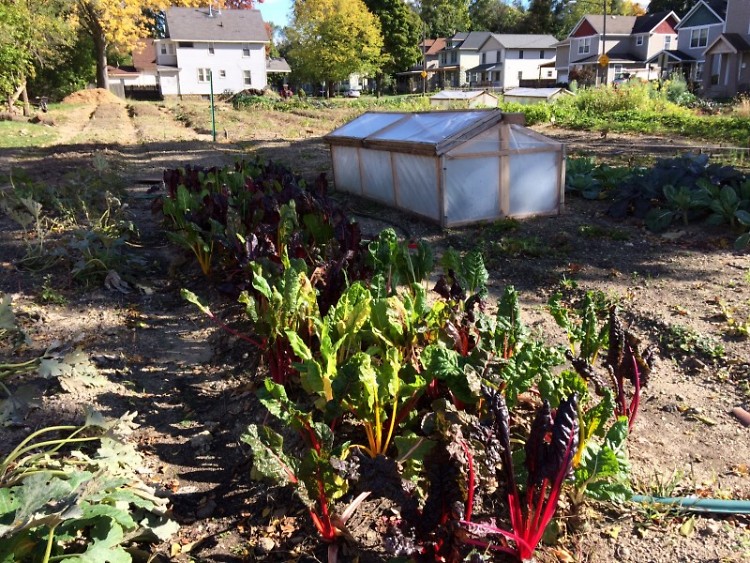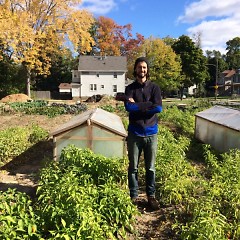Urban Roots is an urban agriculture organization that sits among the houses in the Madison neighborhood in the city of Grand Rapids. They grow fresh vegetables on their community farm at 1316 Madison and have a farm stand on Thursdays. And according to Levi Gardner, the founder and executive director of Urban Roots, urban agriculture is the entry point into a much larger conversation.
“A lot of people go, ‘Urban agriculture! That’s cool and intriguing! They’re growing food in the city!’ It’s a cool story,” Gardner said. “But I think the danger can be in thinking that it’s about the coolness of the thing. The problem is with the coolness of the thing is that if that’s as deep as it gets, that’s not transformational. That’s not changing anything or any perceptions. That’s just being ‘cool.’ What we’re trying to do, and I think this is the challenge, is think about things like land rights, about ownership, about economic opportunity and education in a way that is equitable.”
Farming, which is in itself a huge set of complex processes, is even more complex than it appears. It goes so much farther than methods of growing, soil and water.
“I think that when we started out it was an organization about farming, but these things lend themselves into much bigger conversations,” Gardner said. “We’ve become an organization that isn’t just interested in farming but really in justice and how farming relates to that much bigger dialogue and that’s complicated territory to navigate. Once you start to dig into things like farming—farming is about land rights and who has access to land. And land rights are about inequality and who are the dominant and the oppressed class, which is about justice and that’s about distribution of resources, political capital. And then that lends itself to questions even of what do you believe and values and life, about what it is you believe about yourself. What it is to own something.”
All these questions and fears and hopes about farming and the mission of Urban Roots are connected directly to the Madison neighborhood where Urban Roots is. Gardner sees inequities that threaten people and places in their neighborhood and pointed out that it’s in the language that’s often used today. It’s in the way people think and talk about “growth.”
“We use the word ‘development’ and that’s a popular word—‘Grand Rapids is a growing city,’" Gardner said. “Words that I used to use, that people use, are ‘This is a sketchy neighborhood’ or ‘That’s a rough neighborhood’ or ‘Lots of broken homes.’ There’s all this language and really what it does is go ‘Hey, I’m slightly better than you for whatever reason.’ But for instance, show me a sketchy neighborhood and I’ll show you a neighborhood where there’s at least one mom trying to take care of her kids.”
“Sometimes these developments happen without asking anyone what it is they really want or need and we’re trying to create an avenue for people to have a place to vocalize those concerns and thoughts,” said Jenny Bongiorno, the program manager at Urban Roots.
The beauty of agriculture, according to the Urban Roots team, is that it’s an equalizer. No matter who someone is or what their home looks like, they need sustenance and an understanding of their body. Gardner said that people will tell you what they need and you have to listen. It’s not about growing food for others, but for everybody, for all of us. It’s about thinking through what the word belonging means.
Gardner’s long-term vision for the farm is that the land won’t belong to a non-profit but eventually owned by the neighborhood itself.
In the meantime though, Urban Roots has programming that investigates “belonging” and “growth” here and now.
“Justice is a theme that runs through and under and in all the programming that we do here,” Bongiorno said. “The reason that we decided to call Urban Roots a community farm is because we really believe in place/space programming and things that serve the community they’re in.”
The farm is a place for neighbors to work alongside one another as well as for people across Grand Rapids to learn about and practice Urban Roots’ vision of place/space programming. Their mission is to cultivate durable and resilient communities, families and ecosystems.
“A lot of people think of us as just a farm but really we have a farm and we use it as a tool for education and for building community and bringing people access to food in this neighborhood,” Bongiorno said.
Urban Roots hosts classes and workshops throughout the year related to things like growing food, cooking food and soil health.
Urban Roots also has the Group Service Learning program which involves different groups of people coming in to spend time on the farm. School groups, businesses, groups of friends and other kinds of teams will hear about the work Urban Roots is doing and take a tour. They’ll get their hands dirty while they work together on the farm then share a fresh farm lunch. The Group Service Learning experiences are built to support whatever a particular group is interested in, from building gardens, to soil, to cooking food, preserving food and food justice.
During the summer, Urban Roots in partnership with GR Center for Urban Transformation facilitates YouthCorps, an employment and education program for refugee youth. YouthCorps members get in on the day-to-day work of Urban Roots, learning and practicing urban agriculture and the larger conversation surrounding it.
Urban Roots takes community farming on the road too, bringing their mobile classroom out to build gardens with partners in the city who are ready to grow their own space and are interested in the seeds of resource, knowledge and support Urban Roots is able to provide.
“For me, it’s about engaging people in positive, productive, meaningful ways no matter who they are,” Bongiorno said.
“We’re trying to humanize the work of agriculture and education to say it’s democratic and it’s fair and just and that everybody’s invited to it,” Gardner said.
And that’s messy work, according to Gardner. Things that should be democratic, fair and inviting aren’t always that way.
“There’s imbedded in the systems of economy and political sovereignty that we have all sorts of levels of injustice. People miss out that the humanity in me is the same as the humanity in you and it’s the same as the humanity in a person who has experienced homelessness and incarceration and substance abuse. The humanity that runs through all of us is the same. Grand Rapids is generally a city that sees myself as slightly up here and you as down here just a little bit more, whoever it is. And it’s those systems of oppression that really threaten what growth looks like.”
What Gardner is interested in these days is asking about and thinking through other kinds of development.
“One of Urban Roots goals is 'What is an economy of love and economy of justice?' An economy of transparency and honesty rather than an economy of 'be one more step in front of the other guy' or 'beat the other guy,'” Gardner said.
While talking about the kind of growth Urban Roots is really trying for, Gardner referenced Socrates, who said, “The unexamined life is not worth living.”
“Our goal is to help ourselves and each other live the examined life,” Gardner said. “And once we’ve examined that life, figure out how to live better. I think there’s something out there waiting for us.”
The Rapidian, a program of the 501(c)3 nonprofit Community Media Center, relies on the community’s support to help cover the cost of training reporters and publishing content.
We need your help.
If each of our readers and content creators who values this community platform help support its creation and maintenance, The Rapidian can continue to educate and facilitate a conversation around issues for years to come.
Please support The Rapidian and make a contribution today.


